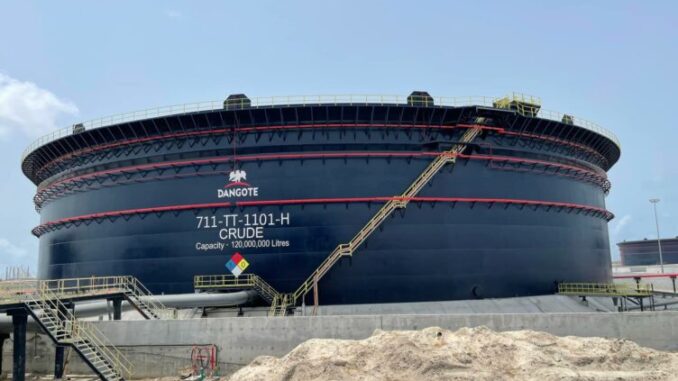
The Nigerian Upstream Petroleum Regulatory Commission (NUPRC), on November 1, said it was “determined to enforce the domestic crude oil supply obligations” for Nigerian refineries.
Nigerian National Petroleum Corp. (NNPC) will begin supplying crude to the new Dangote refinery in December of this year.
Reuters has reported that NNPC will provide up to six cargoes of crude in December, it said, citing three industry sources.
An NNPC official told the news agency the six cargoes, around 200,000 barrels per day, would come under part of a one-year deal. Other sources said supplies would be four to five cargoes, or 130,000 bpd, were planned.
NNPC has a 20% stake in the 650,000 bpd facility. As part of its shareholding, it has an agreement to supply crude to Dangote Group’s Lekki plant.
Muhammadu Buhari, then Nigeria’s president, commissioned the facility in May 2023. The plant had been long overdue and over budget.
The Dangote plant will have a major impact on trade flows in the Atlantic Ocean. Bank of America, in a report this week, said the plant would account for half the world’s refining capacity growth in 2024.
It is likely to reduce product flows to Nigeria, with the plant’s output meeting local demand, and also reduce the export of Nigerian crude.
How fast the refinery may come up to full operations remains unknown. Energy Aspects has previously predicted this may only come in the second quarter of 2025 at the earliest.
Supply obligations
The Nigerian Upstream Petroleum Regulatory Commission (NUPRC), on November 1, said it was “determined to enforce the domestic crude oil supply obligations” for Nigerian refineries. NUPRC head Gbenga Komolafe said modular refineries were facing challenges on feedstock.

Supplying refineries is required under the Petroleum Industry Act (PIA), he said. The 2021 legislation gave authority to the NUPRC to impose domestic crude supply obligations, although it does require this takes place at the prevailing international market price.
Komolafe held talks with Aliko Dangote, head of the Dangote Group, on October 28.
https://buy-eu.piano.io/checkout/template/cacheableShow?aid=4lyje0Z6pe&templateId=OTZTJHWE3W6G&offerId=fakeOfferId&experienceId=EXFLJJEKLDN2&iframeId=offer_0a1f9c26086beb8cdeb8-0&displayMode=inline&pianoIdUrl=https%3A%2F%2Fid-eu.piano.io%2Fid%2F&widget=template&url=https%3A%2F%2Fwww.energyvoice.com
Failing fleet
Between 2020 and 2021, Nigeria spent 200 billion naira ($253 million) on refinery rehabilitation, according to the most recent numbers from NEITI. None of the four refineries are currently processing oil.
The Warri refinery reached 60% completion on its repairs in July.
In the summer, NNPC said it hoped to restart plant operations by November or December. However, the Warri works face “significant challenges due to insufficient funding”, it said.
Daewoo E&C won quick fix work on the Warri refinery in June 2022. The Korean company said work would run until December 2023.
Minister of State for Petroleum Resources Heineken Lokpobiri said in October that the Kaduna refinery would be ready to resume in the fourth quarter of 2024. Nigeria awarded a contract to Saipem for work on the Kaduna plant.
Italy’s Maire Tecnimont won a $1.5 billion contract for rehabilitation work on the two Port Harcourt refineries in April 2021. The oil minister, speaking in September, said the Port Harcourt complex would start up in December.
Tecnimont, in 2022, won work to design a new 100,000 bpd refinery inside the Port Harcourt facility. The aim, it said, was to be operational in 2025.
Investigation
The Nigerian Senate launched an ad hoc committee to investigate contracts awarded for work on the four refineries in late October.
The committee should provide a report within four weeks.
